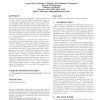SC
2009
ACM
14 years 6 months ago
2009
ACM
One of the main advantages of using a scientific workflow management system (SWfMS) to orchestrate data flows among scientific activities is to control and register the whole work...
SC
2009
ACM
14 years 6 months ago
2009
ACM
This paper presents a new distributed computing framework for Many Task Computing (MTC) applications, based on the Extensible Messaging and Presence Protocol (XMPP). A lightweight...
SC
2009
ACM
14 years 6 months ago
2009
ACM
SC
2009
ACM
14 years 6 months ago
2009
ACM
Scientific workflow tools allow users to specify complex computational experiments and provide a good framework for robust science and engineering. Workflows consist of pipelines ...
SC
2009
ACM
14 years 6 months ago
2009
ACM
SC
2009
ACM
14 years 6 months ago
2009
ACM
Recent and future parallel clusters and supercomputers use SMPs and multi-core processors as basic nodes, providing a huge amount of parallel resources. These systems often have h...
SC
2009
ACM
14 years 6 months ago
2009
ACM
Large graph analysis has become increasingly important and is widely used in many applications such as web mining, social network analysis, biology, and information retrieval. The...
SC
2009
ACM
14 years 6 months ago
2009
ACM
Bioinformatics researchers need efficient means to process large collections of sequence data. One application of interest, genome assembly, has great potential for parallelizati...
SC
2009
ACM
14 years 6 months ago
2009
ACM
Science requires collaboration. In this paper, we investigate the feasibility of coupling current social networking techniques to science gateways to provide a scientific collabor...
SC
2009
ACM
14 years 6 months ago
2009
ACM
Science Gateways have emerged as a valuable solution for providing large numbers of users with access to advanced computing resources. Additionally, they can hide many of the comp...






